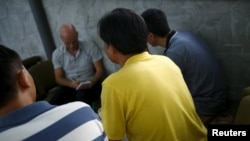Chinese dissidents fleeing abroad have long used Thailand as a route for escaping repression at home. In recent years, Thailand’s government has been cooperating more with Beijing’s effort to pursue dissidents overseas, putting them at risk.
Several cases show how Chinese police are working through Thai law enforcement agencies, or even traveling to Thailand on their own, to try to find fleeing dissidents and bring them back to China.
Jian Xing escaped to Thailand in 2015 after volunteering for a Chinese civil rights website and speaking out about corruption in the local government.
He told VOA that before he qualified to move to New Zealand in 2019, four police officers came to his residence in Thailand and took away his belongings without a search warrant.
"They told me that they could kill me in Thailand, and nobody would even know," Xing said.
Yong Hua, an exiled artist, fled Thailand in 2019 after being stalked, arrested and sent to re-education camp by Chinese authorities because he said he voiced opposition to what the Chinese government has done to its people over the years. He recalled being constantly on the run to avoid Chinese agents hired by the government.
Hua told VOA that a Twitter account with no followers sent him a YouTube video on Aug. 28, saying, the "Thai Chinese Chamber of Commerce" offered a reward of $1,600 (50,000 baht) for him, accusing him of scamming money and saying they will post a "wanted notice" with his photograph on it in Bangkok and other places.
“I don’t know if the so-called Chamber of Commerce is real,” Hua said. “I suspect they are the Chinese spies.”
A VOA reporter called the phone number on the notice, but no one answered.
Some dissidents say the situation in Thailand has become so difficult that some of them are choosing to go back to China “voluntarily” under pressure from the Thai and Chinese governments. Xing refused.
“I told them if you deport me forcefully, then you will only get my corpse,” he said.
Xing’s incident caused panic among Chinese refugees stranded in Thailand. Other refugees sent the video of police in Xing’s home to the United Nations High Commissioner for Refugees (UNHCR) to seek help. By then, Xing had already been sent to an immigration detention center waiting to be repatriated to China. Eventually, he received emergency humanitarian assistance and was resettled in New Zealand.
Hua is making a documentary on the plight of Chinese refugees in Thailand waiting to relocate to third countries, which connected him with other refugees. He said many people who have fled China to Thailand, and even among those who qualify for refugee status, are living in very difficult situations.
"I think they are suffering too much,” said Hua. “This suffering has two sides. The first one is economic, because you can't work in Thailand. It's illegal. Even if you get the refugee card, Thailand doesn't recognize it. If your passport expired, you can get caught if you stay here. So, they are under a lot of financial pressure,” Hua told VOA. “Some people go to temples, to places that don’t charge them, because they have no money."
Hua said even worse is the second kind of suffering, the mental pressure.
"I think refugees all have severe or mild depression. They are not very healthy mentally," he said.
Many refugees have been in Thailand for years waiting to be resettled, and their state of mind is very worrying. Hua said because many people are Christians, Falun Gong practitioners and activists, they are afraid of being followed by people from China. So, they are very nervous and tense.
Hua has been to the U.S. Embassy and the UNHCR to seek help and share his experience. He hopes to move to the United States where he thinks he will be safe.
Hua said he received a case number from the UNHCR and was told that the second interview would be held next year. But he said the U.N. officer told him there are too many cases like his.
Adrianna Zhang contributed to this report.




